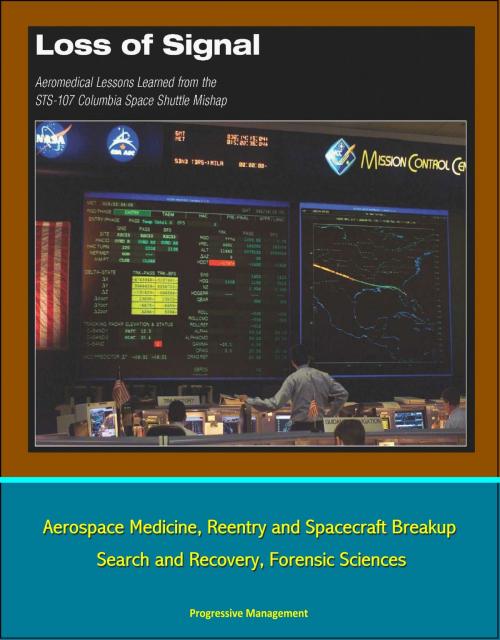Loss of Signal: Aeromedical Lessons Learned from the STS-107 Columbia Space Shuttle Mishap - Aerospace Medicine, Reentry and Spacecraft Breakup, Search and Recovery, Forensic Sciences
Nonfiction, Science & Nature, Technology, Aeronautics & Astronautics, Science, Physics, Astrophysics & Space Science| Author: | Progressive Management | ISBN: | 9781310505430 |
| Publisher: | Progressive Management | Publication: | June 22, 2014 |
| Imprint: | Smashwords Edition | Language: | English |
| Author: | Progressive Management |
| ISBN: | 9781310505430 |
| Publisher: | Progressive Management |
| Publication: | June 22, 2014 |
| Imprint: | Smashwords Edition |
| Language: | English |
Loss of Signal presents the aeromedical lessons learned from the Columbia accident that will result in enhanced crew safety and survival on human space flight missions. As we embark on the development of new spacefaring vehicles through both government and commercial efforts, the NASA Johnson Space Center Human Health and Performance Directorate is continuing to make this information available to a wider audience engaged in the design and development of future space vehicles. Loss of Signal summarizes and consolidates the aeromedical impacts of the Columbia mishap process—the response, recovery, identification, investigative studies, medical and legal forensic analysis, and future preparation that are needed to respond to spacecraft mishaps. The goal of this book is to provide an account of the aeromedical aspects of the Columbia accident and the investigation that followed, and to encourage aerospace medical specialists to continue to capture information, learn from it, and improve procedures and spacecraft designs for the safety of future crews.
Foreword - Jeffrey R. Davis * Preface and Acknowledgments * Editorial Board * Introduction * Michael Barratt * Section 1 - The Mission * The Mission and The Crew * Helen W. Lane, Smith Johnston, and John B. Charles * The Mishap * Stevan Gilmore and Charles Campbell * Section 2 - The Response * Search and Recovery Team Operations * James D. Wetherbee * Mishap Investigation Team Medical Efforts for Crew Recovery and Identification * Philip C. Stepaniak, Michael R. Chandler, and Robert Patlach * Mishap Response and Lessons Learned: The Role of the Office of the Armed Forces Medical Examiner and the Armed Forces Institute of Pathology * Craig Mallak * Johnson Space Center Space Life Sciences Response and Crew Survival Investigation * Jeffrey R. Davis * Kennedy Space Center Operations - Commitment to Safety and Preparedness * Philip J. Scarpa * Crew Medical and Psychological Support Operations * Smith Johnston and Christopher Flynn * Section 3 - The Investigation * Columbia Accident Investigation Board Medical Operations and Crew Survivability Working Group * James P. Bagian * The Columbia Crew Survival Investigation Report: The Five Potentially Lethal Events and Crew Survivability * Nigel J. Packham, David J. Pogue, and Pamela A. Melroy * Section 4 - The Analysis * Aerospace Medical Forensic Analysis * Michael Barratt, Robert Banks, Philip C. Stepaniak, and Helen W. Lane * Legal Analysis and Issues from Recovery and Investigation of the Columbia Accident * Donna M. Shafer and Amy V. Xenofos * Section 5 - The Future * Human Space Flight Incidents and Crew Survival Lessons Learned * Jonathan B. Clark * The Future: Crew Survival Investigations * Karon Woods * Appendix * Abbreviations and Acronyms * Selected Readings * Recognition and Acknowledgments * Contributors' Biographies
These lessons were presented to limited audiences at three separate Aerospace Medical Association (AsMA) conferences: in 2004 in Anchorage, Alaska, on the causes of the accident; in 2005 in Kansas City, Missouri, on the response, recovery, and identification aspects of the investigation; and in 2011, again in Anchorage, Alaska, on future implications for human space flight. As we are embarking on the development of new spacefaring vehicles through both government and commercial efforts, the NASA Johnson Space Center Space Life Sciences Directorate (SLSD) proceeded to make this information available to a wider audience engaged in the design and development of future space vehicles.
Loss of Signal presents the aeromedical lessons learned from the Columbia accident that will result in enhanced crew safety and survival on human space flight missions. As we embark on the development of new spacefaring vehicles through both government and commercial efforts, the NASA Johnson Space Center Human Health and Performance Directorate is continuing to make this information available to a wider audience engaged in the design and development of future space vehicles. Loss of Signal summarizes and consolidates the aeromedical impacts of the Columbia mishap process—the response, recovery, identification, investigative studies, medical and legal forensic analysis, and future preparation that are needed to respond to spacecraft mishaps. The goal of this book is to provide an account of the aeromedical aspects of the Columbia accident and the investigation that followed, and to encourage aerospace medical specialists to continue to capture information, learn from it, and improve procedures and spacecraft designs for the safety of future crews.
Foreword - Jeffrey R. Davis * Preface and Acknowledgments * Editorial Board * Introduction * Michael Barratt * Section 1 - The Mission * The Mission and The Crew * Helen W. Lane, Smith Johnston, and John B. Charles * The Mishap * Stevan Gilmore and Charles Campbell * Section 2 - The Response * Search and Recovery Team Operations * James D. Wetherbee * Mishap Investigation Team Medical Efforts for Crew Recovery and Identification * Philip C. Stepaniak, Michael R. Chandler, and Robert Patlach * Mishap Response and Lessons Learned: The Role of the Office of the Armed Forces Medical Examiner and the Armed Forces Institute of Pathology * Craig Mallak * Johnson Space Center Space Life Sciences Response and Crew Survival Investigation * Jeffrey R. Davis * Kennedy Space Center Operations - Commitment to Safety and Preparedness * Philip J. Scarpa * Crew Medical and Psychological Support Operations * Smith Johnston and Christopher Flynn * Section 3 - The Investigation * Columbia Accident Investigation Board Medical Operations and Crew Survivability Working Group * James P. Bagian * The Columbia Crew Survival Investigation Report: The Five Potentially Lethal Events and Crew Survivability * Nigel J. Packham, David J. Pogue, and Pamela A. Melroy * Section 4 - The Analysis * Aerospace Medical Forensic Analysis * Michael Barratt, Robert Banks, Philip C. Stepaniak, and Helen W. Lane * Legal Analysis and Issues from Recovery and Investigation of the Columbia Accident * Donna M. Shafer and Amy V. Xenofos * Section 5 - The Future * Human Space Flight Incidents and Crew Survival Lessons Learned * Jonathan B. Clark * The Future: Crew Survival Investigations * Karon Woods * Appendix * Abbreviations and Acronyms * Selected Readings * Recognition and Acknowledgments * Contributors' Biographies
These lessons were presented to limited audiences at three separate Aerospace Medical Association (AsMA) conferences: in 2004 in Anchorage, Alaska, on the causes of the accident; in 2005 in Kansas City, Missouri, on the response, recovery, and identification aspects of the investigation; and in 2011, again in Anchorage, Alaska, on future implications for human space flight. As we are embarking on the development of new spacefaring vehicles through both government and commercial efforts, the NASA Johnson Space Center Space Life Sciences Directorate (SLSD) proceeded to make this information available to a wider audience engaged in the design and development of future space vehicles.















